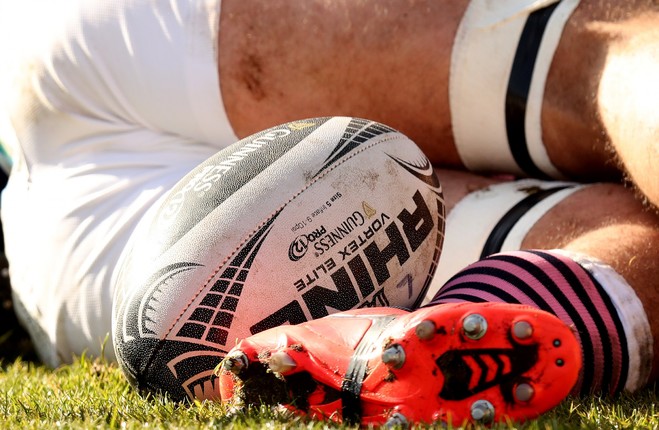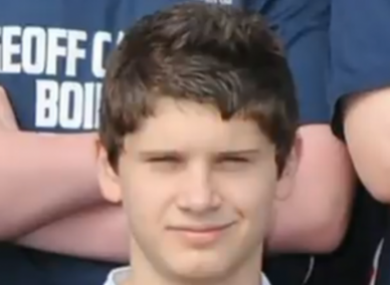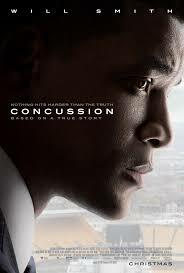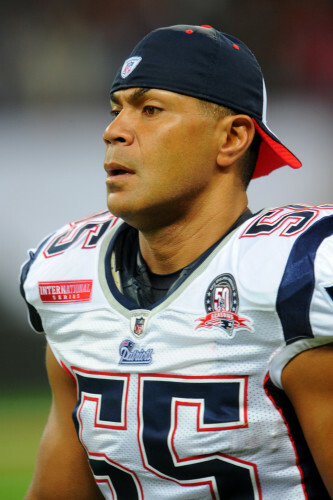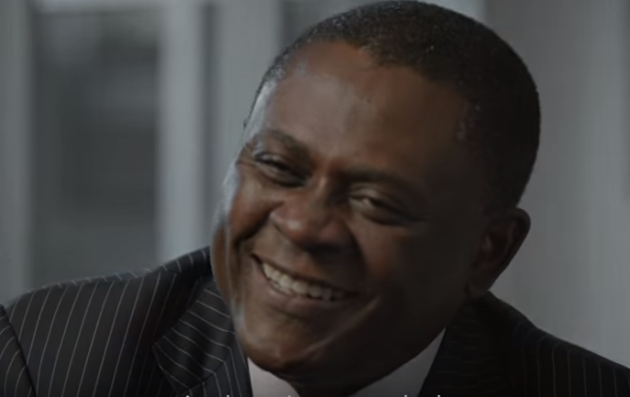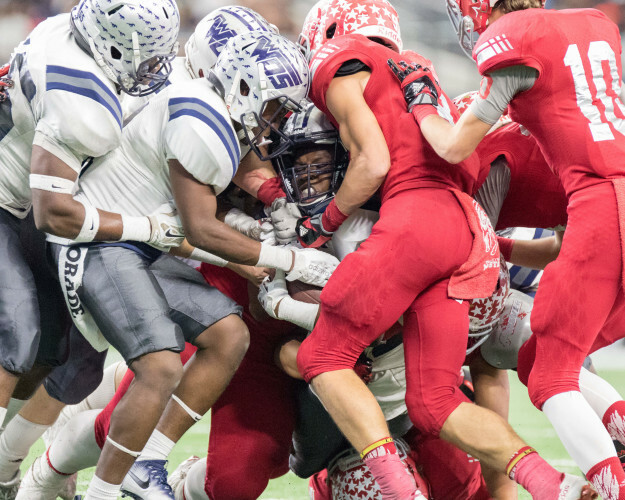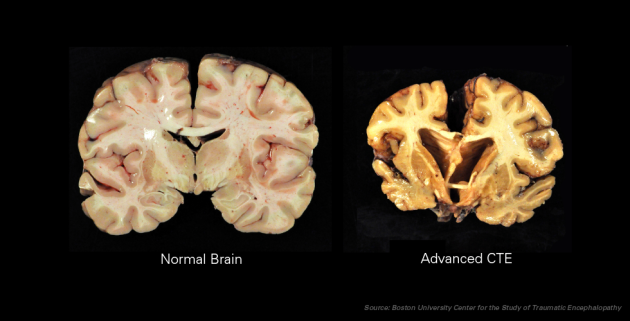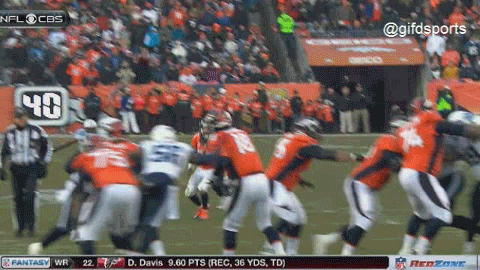DR. BENNET OMALU wants to make one thing very clear.
He doesn’t want your children to stop playing sports, he just believes it is irresponsible that, as a society, we allow them to absorb thousands of blows to their brain while it is still developing.
His own kids play sport — badminton, tennis, swimming, track and field — and, crucially, have never once suffered a concussion.
“If a child asked you for a cigarette, you wouldn’t give it to him,” Omalu told The42 today as he prepares to deliver a Royal College of Surgeons in Ireland MyHealth public lecture entitled ‘Knocking Out Concussion in Sport’ this evening.
But you send that child onto a field to slam his head against the heads and bodies of other children and I ask you, which is more dangerous, a cigarette or a violent blow to the head?”
If Omalu’s name is familiar, it’s probably because he was the subject of the Will Smith movie, Concussion, which focused on his discovery of chronic traumatic encephalopathy in American football players.
While working in the Allegheny County Coroner’s Office in Pennsylvania in 2002, the then 34-year old examined the body of Mike Webster, a local hero whose post-NFL career saw a massive change in personality which resulted in him living in his car for large spells and displaying ever-increasing symptoms of dementia, before eventually dying of a heart attack at 50.
Olmalu, who went to medical school at the age of 15 before qualifying as a physician at 21, knew immediately that Webster’s behaviour before his death wasn’t related to heart issues but nothing in any medical text book could explain it.
It was up to him to unearth what was going on and he drew on personal experience to uncover the truth.
“I never wanted to be a doctor, I wanted to be an airline pilot, to fly people around the world,” Omalu says.
“I was born during the Nigerian civil war and I was malnourished and suffered psychological and physical traumas from that war. My childhood was very difficult.
I grew up with low self-esteem, depression and my therapy for my psychological struggles was to embrace education and I got lucky. I became very intellectually competent and, in those days in Nigeria, the expectation was that the top students would go to medical school.
“But I paid a price for going to school that early, my depression got worse and I dropped out of medical school at one point.
“But in the darkness of my struggles, I discovered myself. Ironically, in life, your greatest platform for self-discovery is those times of very serious struggles.
“I still struggle with depression because depression is a very serious illness that doesn’t come and go like appendicitis, it stays with you for a long time but you just learn to manage it.
“So I discovered in life that successes are less likely to come your way unless you embrace your weaknesses, your failures, your constraints and turn them around.
“I never positioned myself as somebody who is gifted, far from that, but one thing I recognise is that life can be difficult, life can be brutal and you need to always look at what is available to you to create value for yourself.”
It was those struggles in his early life that drew him to Webster’s case. There was something in the former Pittsburgh Steeler’s behaviour that he could identify with from his own struggles with mental illness.
“The struggles I had as a child, as a young man, enabled me to stand firm when I found myself in the middle of this big, big, big, challenge. I never set out to discover CTE in the brain of Mike Webster.
“But I was also just doing my job.
“The day I met Mike Webster, the humanity of my faith, my life experiences and my science came together. I saw myself in Mike Webster. He struggled, I struggled too. I was somewhat instigated to help him out.
“I wondered why would he behave the way he behaved after retirement, it just did not make sense to me. Being a forensic pathologist, there is no such thing as coincidence. If everything was a coincidence a wife could kill her husband, a husband could kill his wife and you’d just put it down to coincidence.
You need to dig deeper, so I started digging deeper and applying generally accepted principles of medicine. What really helped me was that I was within an independent environment.
“I was doing my research by myself so my thinking was independent. I was not within the institutional framework or hierarchical system that would have impeded me.
“What I’ve noted is that, many times, there are conflicts of interest and many conflicts can arise without you even noticing it.
“When I saw the disease, I put one and two together and it was as simple as that.”
Omalu submitted a paper entitled “Chronic Traumatic Encephalopathy in a National Football League Player” to the medical journal Neurosurgery in July 2005 and was soon informed that the NFL’s Mild Traumatic Brain Injury Committee was demanding a retraction.
The NFL is a multi-billion dollar organisation with the lawyers to match, but Omalu was unperturbed and pressed ahead with examining another NFL player, Terry Long who exhibited many of the same symptoms as Webster before dying by suicide in his mid-forties.
Omalu’s research was described as flawed and a smear campaign against his work was instigated. However, he pressed ahead, trusting the science to speak for itself.
“What intrigued me was why was I the only person to see this? Why me, a foreigner?
“Football is America’s most popular sport, it is a wealthy industry and I discovered in it something I call ‘confirmational intelligence’ which is a phenomenon where you as an individual — without even knowing it — your mentality, your intuition, your way of thinking, your reasoning and the way you perceive your environment is controlled by the expectations of the society you belong to.
“You abide by the traditions, norms and cultures of that society without you even being aware of it.
“But that means you are embedded in a certain way of being and, when objective evidence is provided to you to challenge that way of being, you get emotional, you deny and dismiss that objective evidence, without even being aware of why.
“That results in more tribalism on your part and impedes your emotional IQ and you just become irrational and more embedded in tribal thinking.
This is what I’m seeing in the sports industry. In society, people have become so embedded in sports culture, they have become oblivious of the consequences and dangers of certain sports. They are ignoring very natural and normal trends in society.
“Science is evolving but we are engaging in ‘confirmational intelligence’ to reject scientific evidence, to dismiss it and even sometimes to ridicule the messenger just to continue conforming to a sports sub-culture.”
Omalu says you only have to look at the end of slavery, women winning the right to vote and same-sex marriage for evidence of how the world changes for the better no matter the scale of protestations.
“What science is teaching us is that, in the fullness of time, mankind must evolve whether we like it or not. There have been times where fundamental changes have occurred that were very inconvenient to society as it was and one example is slavery.
“When it was time to stop slavery, America fought a civil war, thousands of people died, just to hold on to that ’confirmational intelligence’. People were afraid of what would happen.
But what happened? The world is a better place without slavery.
“There was a time women couldn’t hold property, women couldn’t vote and when it was time to change people in society said ‘oh no, the world will come to an end’ and what happened? Women voted and the world is better for it.
“Recently, with the issue of gay marriage. Two men or two women love each other and they want to get married and some people in society said ‘oh no, the world will come to an end’
“Women are marrying women, men are marrying men and what happened? The world is better for it.
“So when it comes to sport, it’s not about all sports, it’s only about a small segment of sport, the high-impact, high-contact and collision ones; rugby, American football, boxing, mixed martial arts, ice hockey and wrestling.
“These are sports where you can never take the head out of the sport. The head is always part of the sport.
“My position has always been that children under the age of 18 should not play these games because it damages their brains.
“There was a time children smoked. Their was a time children drank alcohol. There was a time children engaged in manual labour. But as a modern society we changed all of that because it is our duty to protect the most vulnerable in society.
These sports, if you play them as a child, there is a 100% risk exposure of brain damage. That is a fact.”
Omalu is of a mind that, whether you agree with him or not, the scientific evidence is absolute that there are certain sports children should not play.
The message seems to be getting through too as, last year, 10,000 fewer high school kids played American football than the year before as the evidence mounts of its dangers.
“In the movie, Concussion, there is a scene where Will Smith says that ‘God did not create mankind to play American football.’ That is true.
“Human beings are intellectual animals, that’s what separates us from the other animals, but when a child plays a sport like American football or rugby, you are robbing that child of his or her intellect. You are denying that child their humanity.
If a child asked you for a cigarette, you wouldn’t give it to him but you send that child onto a field to slam his head against the heads and bodies of other children and I ask you, which is more dangerous, a cigarette or a violent blow to the head?
“But, because of ‘confirmational intelligence’ we would, intentionally, rather expose our kids to the risk brain damage just for the transient excitement of certain types of sport.
“We shouldn’t ban these sports. We haven’t banned sky-diving, we haven’t banned motor racing. Adults are free to do whatever they want, they have a liberty and free will to do whatever they want.
“I will be the first person to defend the right of an adult to do whatever they want as long as it does not effect the safety of another human being.
“But for children, as a modern society — when we discover dangerous factors — our first role is to protect them but why must sports be exempt from that?”
At a biological level, what is it about a child’s brain that makes it different than an adults, leaving aside the issues of consent around participation.
Olmalu describes it as a building project, one where damage to the foundations effect the structure throughout its entire existence.
“The brain contains about 200 billion cells, more than 200 billion, and those cells are floating in a sea of water. What makes it function is the inter-connectivity of those cells.
“When you are born, you are born with a certain number of brain cells and you cannot create new ones. You can only lose brain cells in life.
The brain does not have any reasonable capacity to repair itself, so whatever injury your brain suffers is for life.
“If you think about the brain of a child as being like a skyscraper that is being constructed then the foundation is quite important.
“In the foundation you have very intricate connections of steel works that are very well-connected and tied together.
“But then there’s an earthquake before the foundations are complete and what happens? That skyscraper is permanently damaged. You have to start new foundations, but you can’t do that with a brain.
“From when you’re born to the age of 18-25 — when the brain is fully developed — say you take a blow to the head, it is transferred to the brain which floats like a balloon inside your head and floats around and causes a shearing. What does that do? That disrupts the inter-connectivity of the brain cells.
“As it’s trying balance itself, there’s another impact and more shearing. And repeat, over and over.
“So when you compare that brain with the brain of a child who has not played a high-impact sport, it can never be as well-formed or as well-aligned.”
Omalu also says that, while parents and sportspeople rightly worry about concussion and big impacts like the one below, it is the repeated blows to the head that are the real danger.
“We should not make this about concussions. You can suffer from permanent brain damage without ever suffering one concussion, it’s about repeated blows.
“Your symptoms can begin to manifest, sometimes, up to 40 years later. You do a CT scan, it will be negative. You do an MRI scan, it will be negative. But there are injuries on the cellular level that CT scans and MRI scans do not have the resolution to detect.
“There is no helmet created by man that can stop such injuries. If we had such technology, how come we’re still suffering brain damage in the NFL?
“All it takes, from studies that have been published, is just one season of rugby to have an effect.
Your child may not have any symptoms at first but, as they become a teenager, begins to develop changes in behaviour, begins to lose their intelligence, begins to struggle with assimilating information, begins to exhibit violent tendencies, irrational behaviours, sexual impropriety and criminal tendencies, begins to abuse alcohol and drugs, begins to develop mood disorders including depression, bi-polar… nobody remembers that child suffered more than 1000 hits to his or her head playing high-contact sport.”
“Dr. Bennett Omalu is not making these things up.
“But why is it taking me, a nobody, an African immigrant to say these things?
“Well I have a Masters in Public Health and it is my duty to inform and give the public the knowledge they need to empower themselves, to heal themselves of the ‘confirmational intelligence’ that surrounds sports.”
Dr Bennet Omalu will deliver a Royal College of Surgeons in Ireland MyHealth public lecture ‘Knocking Out Concussion in Sport’ this evening. The event is full, but you can watch a livestream here from 6pm.
